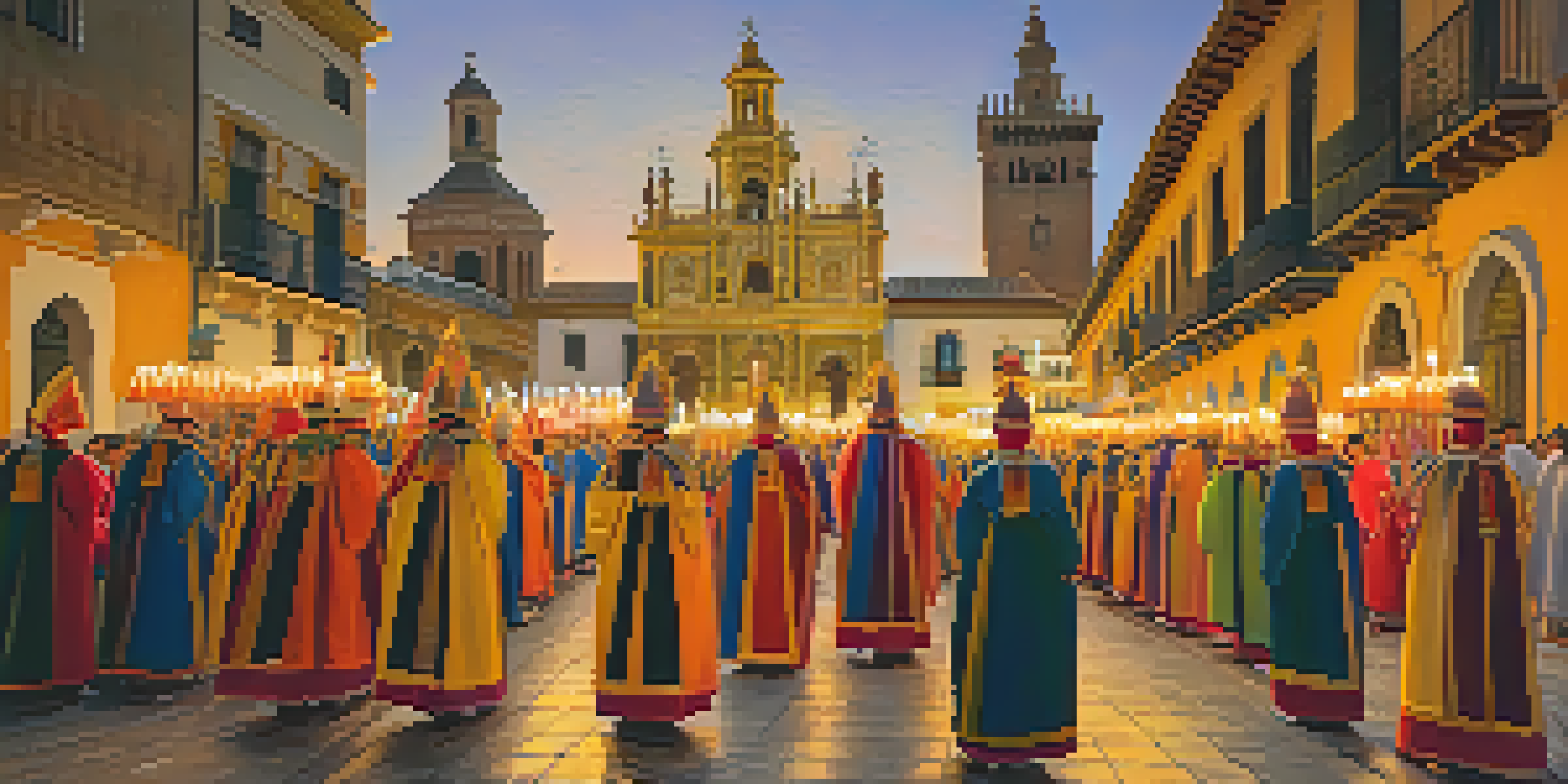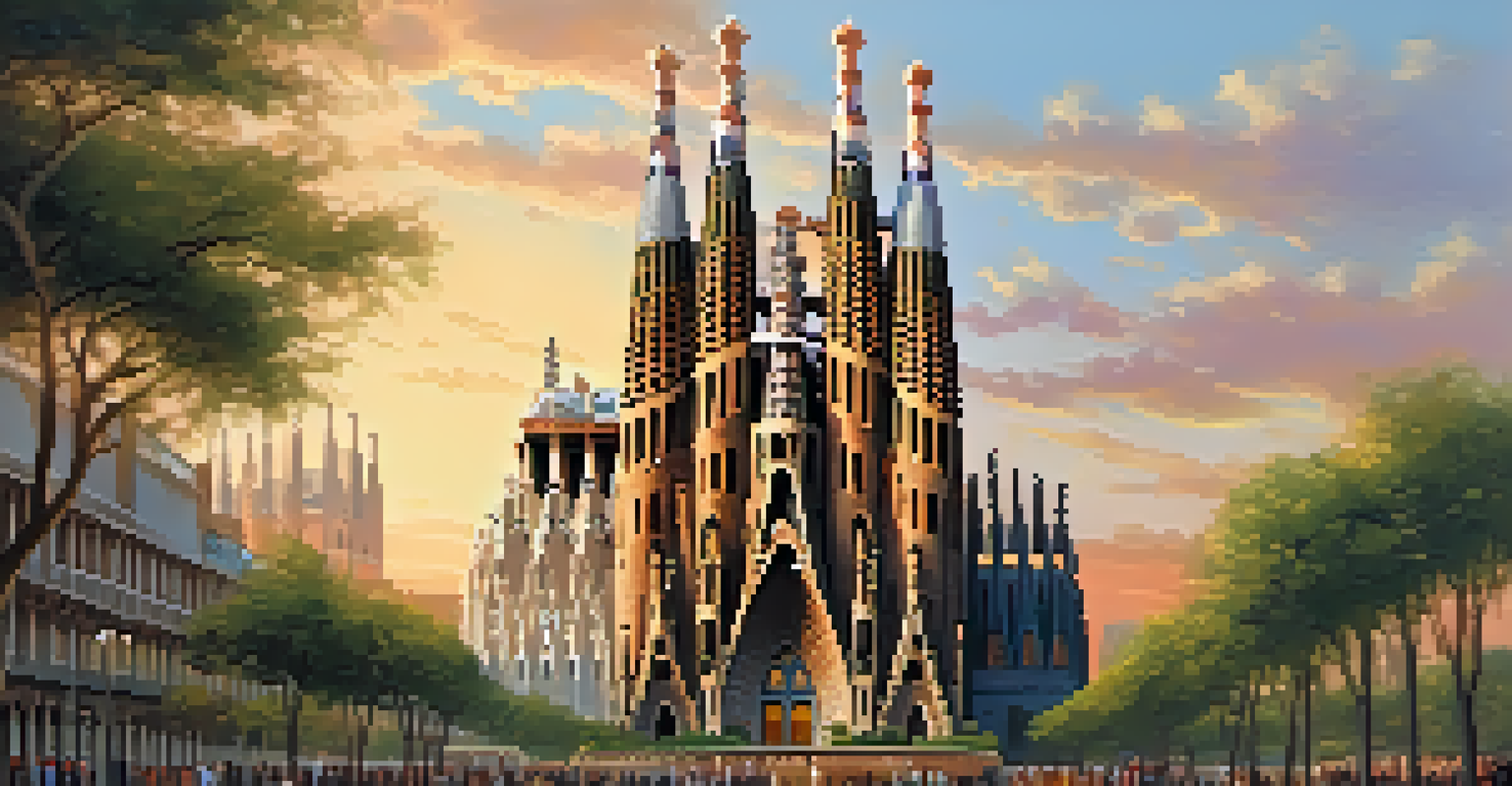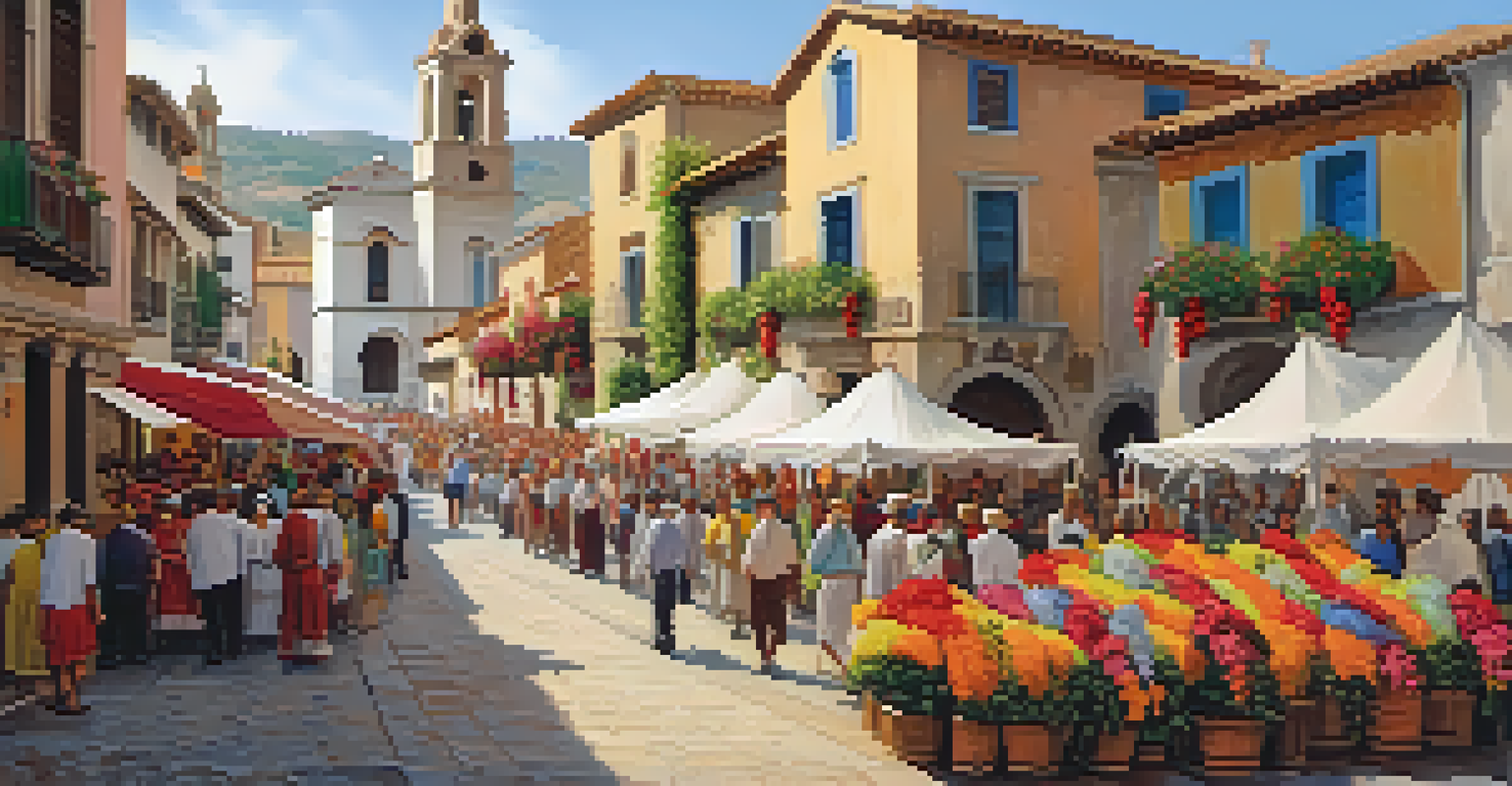The Impact of Christianity on Spain's Cultural Heritage

The Arrival of Christianity in Spain: A Historical Overview
Christianity began to take root in Spain during the Roman Empire, transforming the religious landscape of the region. Early missionaries introduced the faith, and by the 4th century, it was gaining significant ground. This shift not only influenced spirituality but also laid the groundwork for a new cultural identity among the Spanish people.
Christianity is not a mere religion, but a culture that has shaped the very foundations of our society.
As Christianity spread, it intertwined with local customs and traditions, creating a unique blend that would characterize Spanish culture. This fusion was evident in various aspects of life, from festivals to daily rituals, where pagan and Christian elements coexisted harmoniously. The early establishment of churches became focal points for communities, promoting a sense of unity and shared belief.
The Edict of Milan in 313 AD, which granted religious tolerance, further accelerated the acceptance of Christianity in Spain. This pivotal moment allowed for the construction of significant religious sites, marking the beginning of a rich architectural heritage that would flourish over the centuries.
Christianity's Influence on Art and Architecture
One of the most visible impacts of Christianity on Spanish culture lies in its art and architecture. The grand cathedrals, such as the famous Sagrada Familia in Barcelona, reflect not only religious devotion but also the artistic genius of various eras. These structures often blend different architectural styles, showcasing how Christianity influenced local craftsmanship and artistic expression.

Religious themes permeated Spanish art, inspiring countless painters and sculptors. Renowned artists like El Greco and Diego Velázquez created masterpieces that depicted biblical scenes, bringing spiritual narratives to life. Their works not only served religious purposes but also captured the social and political issues of their time, making art a powerful tool for reflection and communication.
Christianity Shapes Spanish Culture
The arrival of Christianity transformed Spain's cultural identity by intertwining with local customs and traditions.
Moreover, religious festivals often featured elaborate processions and displays of artistry that celebrated both faith and community. These events transformed towns and cities into vibrant centers of cultural expression, further cementing Christianity's role in shaping Spain’s artistic landscape.
Literature and Christianity: A Symbiotic Relationship
The impact of Christianity on Spanish literature is profound, with many writers drawing from biblical themes and moral teachings. The works of renowned authors like Miguel de Cervantes often reflect the spiritual struggles and ethical dilemmas faced by individuals in a Christian context. His epic novel, 'Don Quixote,' is not only a tale of adventure but also a commentary on the ideals of chivalry and faith.
Art is the most beautiful of all lies; it is a reflection of a culture deeply rooted in faith and tradition.
Christianity also inspired a wealth of poetry and prose, with themes of love, redemption, and sacrifice permeating Spanish literature. The mystic poetry of St. John of the Cross and the spiritual reflections of Teresa of Ávila illustrate how deeply faith can influence personal expression and artistic creation. Their writings continue to resonate, exploring the human experience through a spiritual lens.
Furthermore, religious texts and translations played a crucial role in shaping the Spanish language and its literary tradition. The Bible's translation into Spanish made the scriptures accessible to the masses, fostering a culture of reading and scholarship that would flourish in the Renaissance period.
The Role of Christianity in Spain's Festivals and Traditions
Christianity has significantly shaped Spain's vibrant festivals and traditions, creating a calendar filled with religious celebrations. Events such as Semana Santa (Holy Week) showcase elaborate processions, where communities come together to honor their faith. These gatherings are not only religious observances but also a display of local culture and artistry, embodying centuries of tradition.
Each region in Spain boasts unique celebrations that reflect local customs while retaining Christian significance. For instance, the Feria de Abril in Seville blends religious devotion with joyous festivities, featuring flamenco dancing, traditional food, and colorful attire. Such events highlight how Christianity has been woven into the cultural fabric, fostering a sense of belonging and identity among the people.
Art and Architecture Reflect Faith
Christianity's influence is evident in Spain's art and architecture, with grand cathedrals and masterpieces that convey spiritual narratives.
Moreover, these festivals often serve as a reminder of Spain's historical journey, including the Reconquista, when Christian kingdoms reclaimed territory from Muslim rule. This complex history has influenced the way festivals are celebrated today, merging memories of faith, struggle, and community into a rich tapestry of cultural heritage.
Christianity's Impact on Spanish Music and Dance
Spanish music and dance have been deeply influenced by Christianity, with many traditional forms incorporating religious themes. The haunting melodies of flamenco often echo spiritual sentiments, reflecting a fusion of cultures, including Christian, Jewish, and Muslim influences. This blend creates a rich auditory experience that tells the story of Spain's diverse heritage.
Religious music, such as choral works and hymns, played a crucial role in church services and community gatherings. Composers like Tomás Luis de Victoria contributed significantly to sacred music, elevating the spiritual experience through harmonies that resonate deeply with listeners. These compositions not only served liturgical purposes but also enriched the cultural landscape, inspiring generations of musicians.
Dance, too, has been shaped by Christian rituals, with many traditional dances originating from religious celebrations. The lively jotas and solemn processional dances reflect the intertwining of faith and cultural expression, showcasing how music and movement can convey deep spiritual meaning while celebrating community.
Education and Christianity: Shaping Values and Morals
Christianity has played a pivotal role in the development of education in Spain, establishing schools and universities that emphasized moral and ethical teachings. The Catholic Church was instrumental in founding institutions of learning, promoting knowledge alongside religious instruction. This educational framework helped shape societal values and fostered a sense of civic responsibility among the populace.
The curriculum often included not only religious studies but also philosophy, literature, and the arts, reflecting a holistic approach to education. This emphasis on a well-rounded education helped cultivate critical thinkers and informed citizens, many of whom would go on to contribute significantly to Spain's cultural and intellectual legacy.
Festivals Showcase Religious Heritage
Spanish festivals, such as Semana Santa, highlight the significant role of Christianity in community celebrations and local traditions.
Additionally, the influence of Christian values can be seen in the emphasis on community service and charity, both of which are integral to Spanish culture. Many educational institutions still uphold these principles today, shaping future generations with a strong moral compass grounded in the teachings of Christianity.
Contemporary Reflections: Christianity in Modern Spain
In contemporary Spain, the influence of Christianity is still palpable, even as the nation becomes increasingly secular. Many national holidays, such as Christmas and Easter, retain their religious significance, celebrated with both traditional customs and modern interpretations. These observances provide a sense of continuity, linking present-day Spaniards to their rich cultural heritage.
Moreover, the dialogue between faith and modernity continues to evolve, with various movements within Christianity addressing contemporary societal issues. The Catholic Church and other Christian denominations engage in social justice initiatives, reflecting a commitment to the values of compassion and community service that are deeply rooted in their teachings.

While Spain has embraced a more pluralistic society, the legacy of Christianity remains a cornerstone of its cultural identity. As the country navigates the complexities of modern life, the interplay between tradition and innovation offers a unique perspective on how faith continues to shape Spanish culture.